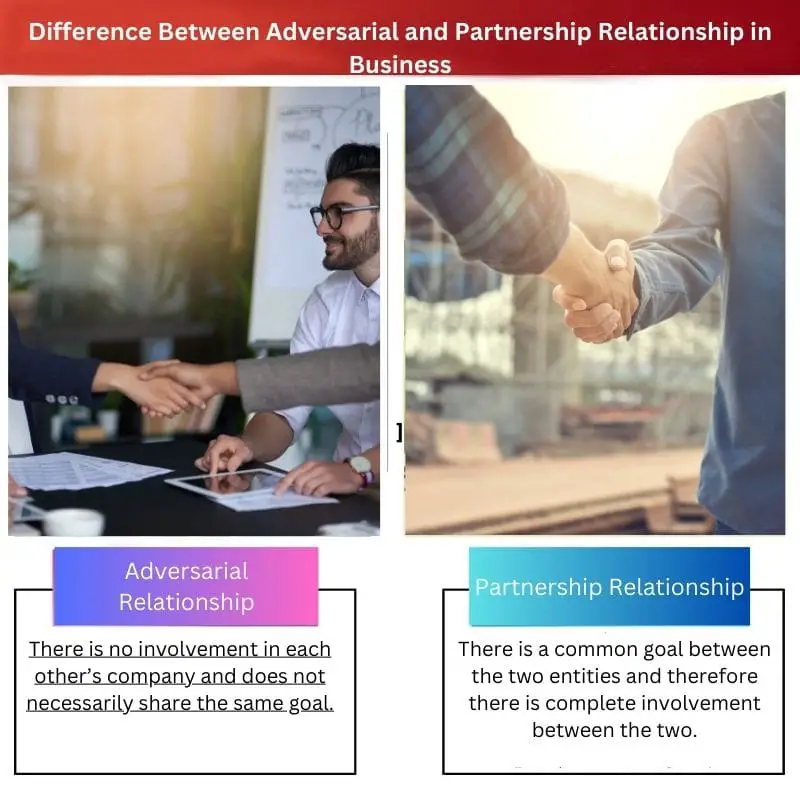Business is defined as an entity, i.e., an organization or enterprise entity involved in professional, industrial and commercial activities. Every entity or company has to maintain a relationship based on work.
The relationship can be of two types: An adversarial relationship and a Partnership relationship.
Key Takeaways
- An adversarial relationship is based on competition and conflict, while a partnership relationship is based on collaboration and mutual benefit.
- An adversarial relationship may result in a win-lose outcome, while a partnership relationship may result in a win-win outcome.
- An adversarial relationship may lead to hostility and mistrust, while partnership relationships may lead to trust and long-term commitment.
Adversarial Relationship vs Partnership Relationship
The difference between an Adversarial relationship and a Partnership relationship in business is that in an Adversarial relationship, entities or companies treat each other as an opponent and have competition in between, whereas, in a Partnership relationship, entities or companies work together and make sure to profit each other.

An adversarial relationship is based on competition with the opponent entity or company. In an adversarial relationship, there is a loss of trust or completely no trust found between the two entities.
In an adversarial relationship, there is only one-sided profit or loss. It does not benefit both entities together. An adversarial relationship has no motive to help the opponent entity in case of any loss it faces.
On the other hand, a partnership relationship is based on collaboration or association between two entities or companies. In a Partnership relationship, there is complete trust or full of trust and faith between the two entities.
In a partnership relationship, if there is profit, then it benefits both entities collaborating. The same goes for the case of facing a loss. Partnership relationship focuses on benefitting each other commercially, industrially or professionally.
Comparison Table
| Parameters of Comparison | Adversarial Relationship | Partnership Relationship |
|---|---|---|
| Involvement | There is no involvement in each other’s company and does not necessarily share the same goal. | There is a common goal between the two entities and therefore there is complete involvement between the two. |
| Trust | There is no trust or very less trust between the two entities. | There is trust and faith between the two companies. |
| Benefits | It focuses on benefitting its own company. | It focuses on equal benefit of the companies or entities. |
| Time Period | It is based on short-term contact. | It is based on long-term contract. |
| Competition | There is a lot of competition. | There is no such competition involves, rather this is an association of two entities. |
What is Adversarial Relationship in Business?
An adversarial relationship is a kind of association faced in business. An adversarial relationship is based on competition with the opponent entity or company.
In an adversarial relationship, there is a loss of trust or completely no trust found between the two entities. In an adversarial relationship, there is only one-sided profit or loss.
It does not benefit both entities together. An adversarial relationship has no motive to help the opponent entity in case of any loss it faces.
Adversarial relationship situations should be managed very wisely. Seven points must be kept in mind during an Adversarial relationship.
Those are: to have a sincere conversation with the opponent entity, to have control in anger, must have patience, must have the audacity to take risks with coworkers, must have a healthy attitude towards the work, and everyone must have a corporate lawyer for the company, must take care of secret adversarial conditions.
The most important thing to keep in mind is to have a strong batch of corporate lawyers.
An adversarial relationship between two companies has a lot of competition, and a lot of conflict between the entities or companies might occur.
Conflicts can take a bad turn and might even push the company or entity into a great loss, in that case, a company needs a corporate lawyer. A corporate make commercial transactions and legal rules certain.
A corporate lawyer will research and make sure of any bankruptcy, illegal transactions, intellectual property harm, accountancy, etc. If any such activities are observed, the lawyer can defend the company, the entity or the company and sue the opponent for such an act.

What is Partnership Relationship in Business?
A partnership business is a legal relationship involving two entities or companies. A partnership relationship is based on collaboration or association between two entities or companies.
In a Partnership relationship, there is complete trust or full of trust and faith between the two entities. In a Partnership relationship, if there is profit, then it benefits both entities collaborating.
The same goes for the case of facing a loss. Partnership relationship focuses on benefitting each other commercially, industrially or professionally. Partnership relationship is categorized into three types: General, limited, and limited liability.
To form a partnership, both entities must sign an agreement based on the terms the partnership will continue. The agreement includes the contributions both companies will make in the partnership, the amount of investment they will make, the distributive share between the entities in the partnership, and the division of responsibilities between the entities.
The state or state’s authority must sign the agreement, as every state has different rules and regulations.
A successful partnership is created. It must be created with the help of an attorney. The attorney gives the idea of how to solve disputes and have a powerful agreement between the entities or companies.
In the case of an ongoing partnership, if an entity wants to separate, then it must be discussed with the attorney. The attorney will sign legal papers in case of such separation.

Main Differences Between Adversarial and Partnership Relationship in Business
- An Adversarial relationship has no trust in between, whereas a Partnership relationship has trust.
- An Adversarial relationship involves a lot of competition, whereas a Partnership relationship has no such controversy or competition.
- An Adversarial relationship does not have any both sides profit, whereas a Partnership relationship focuses on benefitting each other (professionally, commercially or industrially).
- An Adversarial relationship is based on a short-term contract, whereas a Partnership relationship is based on a long-term contract.
- No internal information is shared in an Adversarial relationship, whereas maximum information is shared during a Partnership relationship.


The explanation of adversarial relationships and how they are managed is very informative. It’s important to understand how to handle such situations in the business world.
The comparison table provides a straightforward overview of the differences between adversarial and partnership relationships. I appreciate the clarity of the information presented.
I found the emphasis on the involvement and trust aspects to be particularly insightful. This analysis effectively highlights the significance of these elements within a business context.
The section on partnership relationships is very detailed and illustrates the legal and practical aspects involved. It’s a comprehensive overview of forming and maintaining partnerships.
The description of adversarial relationships and the role of corporate lawyers was particularly engaging. It effectively highlights the legal considerations that come into play in such relationships.
The article’s clear distinction between adversarial and partnership relationships is certainly noteworthy. The sections on corporate lawyers and the handling of conflicts were particularly enlightening.
While the focus on partnership relationships was thorough, the explanation of adversarial relationships and the role of corporate lawyers was particularly impactful. It effectively conveyed the legal complexities involved.
The differences between an adversarial and a partnership relationship were very well explained. It is clear that the partnership is much more beneficial for both entities involved.
The references provided lend credibility to the content presented. It’s always beneficial to have access to the sources of information for further reading.